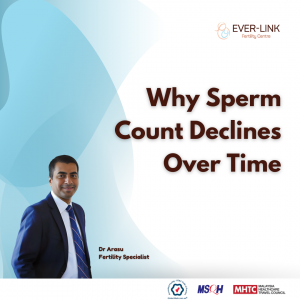
Fertility isn’t just a woman’s issue it also affects men, and age is a significant factor. While the effects of aging on female fertility are often discussed, many people overlook how aging can impact male fertility. This article explores the ways in which sperm count and quality decline with age and the scientific research supporting this claim.
- Age and Male Fertility
Unlike women, men can father children well into old age. However, this doesn’t mean that male fertility remains unchanged as they age. Research has shown that sperm quality begins to decline gradually after the age of 40, with more pronounced changes as men reach their 50s and 60s. A
study in Human Reproduction (2014) found that sperm count decreases by about 1% each year after the age of 40. This decline is due to a variety of factors, including reduced testosterone production and increased oxidative stress, which damages sperm DNA. Men in their 50s and beyond also experience lower sperm motility, meaning the sperm are less likely to swim toward the egg and successfully fertilize it.
- Testosterone and Sperm Production
Testosterone is the key hormone for sperm production, and its levels naturally decline with age. By the time a man reaches his 40s, his testosterone levels may be significantly lower than when he was younger, which directly affects sperm count and motility. The Journal of Clinical Endocrinology & Metabolism (2015) highlights that testosterone levels decline by about 1% annually starting at around age 30, leading to reduced sperm production.
- Oxidative Stress and DNA Damage
Another factor contributing to the decline in male fertility is oxidative stress. Free radicals in the body damage cells, including sperm cells. A study in The American Journal of Epidemiology (2017) found that older men tend to have higher levels of oxidative stress, which leads to DNA damage in sperm. This damage can increase the risk of miscarriage or birth defects if the sperm fertilizes an egg.
- Environmental and Lifestyle Factors
Aside from aging, environmental and lifestyle factors can also play a role in declining sperm quality. Exposure to toxins, smoking, excessive alcohol consumption, and a poor diet can all reduce sperm count and quality. A study in Fertility and Sterility (2015) showed that lifestyle modifications such as eating a healthy diet, avoiding alcohol and smoking, and exercising regularly can help mitigate some of the age related decline in sperm quality.
Conclusion
While age plays a significant role in male fertility, it doesn’t mean that conception is impossible for older men. Maintaining a healthy lifestyle, eating nutritious foods, and avoiding environmental toxins can help preserve sperm health. Men concerned about their fertility should consult a healthcare provider, especially if they are over 40, as proactive measures can improve their chances of fathering a child.

